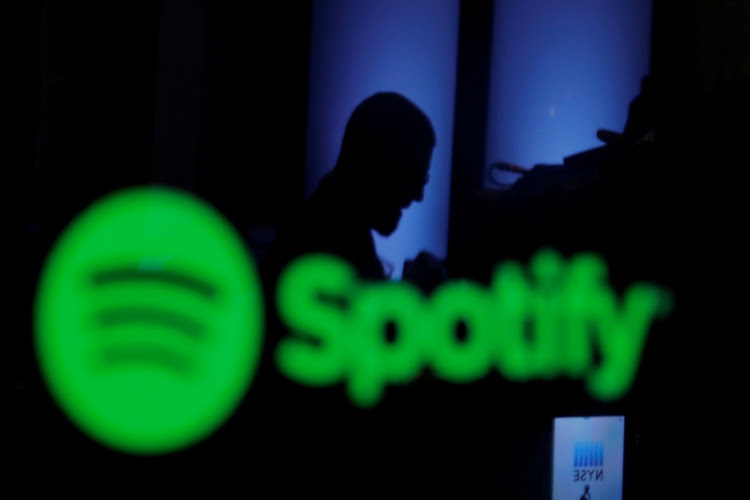A trader is reflected in a computer screen displaying the Spotify brand on the floor of the New York Stock Exchange in New York, US, in this April 3 2018 file photo. Picture: REUTERS/LUCAS JACKSON Johannesburg/Stockholm — Africa, with its internationally recognised musical talent — and growing mobile phone use — is central to Swedish music streamer Spotify’s plans to extend its reach to a billion customers.
As African artists such as Nigeria’s Burna Boy and SA’s Black Coffee are streamed across the world, the continent was seen as an obvious choice and is the home to more than a third of the company’s 85 new markets.
The problem is payment on a continent where many people are more likely to have a mobile phone than a bank account.
That means Spotify’s first task as it implements a plan announced in February to almost double its footprint is to win over the telecom companies that often equate to banks.
Phiona Okumu, Spotify’s head of music for Sub-Saharan Africa, told Reuters the company secured “alternative payment methods”, namely M-Pesa, when it moved into Kenya in February.
Owned by Kenya’s biggest telecoms operator, Safaricom, M-Pesa is used to send money, save, borrow and make payments for goods and services.
“A lot of African countries are unbanked so that means they don’t use credit cards and this is very true for a lot of east African (countries) and in Kenya you use M-Pesa for the most part,” Okumu said.
Elsewhere in Africa, Spotify is seeking other collaborators.
“We are having conversations with the right partners to ensure that we are providing solutions to payment problems that several African consumers face in different parts of the continent,” Okumu said.
Chasing the mobile money
Irene Kophen, a Spotify premium user based in Kenya, said she prefers M-Pesa rather than bank cards because she thinks mobile money has made music more accessible.“Most of us have access to our phones, but not many of us have cards, or bank accounts,” the 31-year-old told Reuters.Costs associated with opening bank accounts, the distance to financial institutions and the difficulty in meeting “Know Your Customers” requirements because of inadequate proof of address have added to the appeal of using phones to pay.“The past few years have seen an emphasis on shifting towards expansion of innovative banking services through mobile technology to capture lower income segments and the unbanked,” a spokesperson for SA’s Absa bank said in an […]
